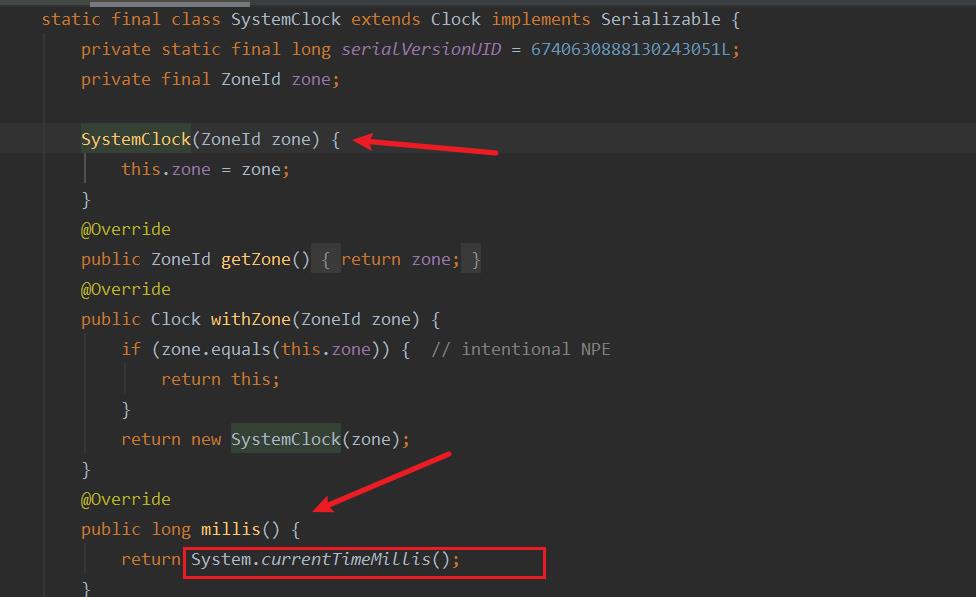❤️高级JAVA开发必备技能❤️java8 新日期时间API(JSR-310:实战+源码分析),5万字详解(JAVA 小虚竹,建议收藏)
Posted 小虚竹
tags:
篇首语:本文由小常识网(cha138.com)小编为大家整理,主要介绍了❤️高级JAVA开发必备技能❤️java8 新日期时间API(JSR-310:实战+源码分析),5万字详解(JAVA 小虚竹,建议收藏)相关的知识,希望对你有一定的参考价值。
❤️作者简介:Java领域优质创作者🏆,CSDN博客专家认证🏆
❤️技术活,该赏
❤️点赞 👍 收藏 ⭐再看,养成习惯
大家好,我是小虚竹。之前有粉丝私聊我,问能不能把JAVA8 新的日期时间API(JSR-310)知识点梳理出来。答案是肯定的,谁让我宠粉呢。由于内容偏多(超十万字了),会拆成多篇来写。
闲话就聊到这,请看下面的正文。
使用场景
对JDK8+中的日期时间工具类封装
项目引用
此博文的依据:hutool-5.6.5版本源码
<dependency>
<groupId>cn.hutool</groupId>
<artifactId>hutool-core</artifactId>
<version>5.6.5</version>
</dependency>
方法摘要
方法明细-now()
方法名称:cn.hutool.core.date.LocalDateTimeUtil.now()
方法描述
当前时间,默认时区
支持版本及以上
参数描述:
| 参数名 | 描述 |
|---|
返回值:
{@link LocalDateTime}
参考案例:
Assert.assertNotNull(LocalDateTimeUtil.now());
System.out.println(LocalDateTimeUtil.now());

源码解析:
/**
* 当前时间,默认时区
*
* @return {@link LocalDateTime}
*/
public static LocalDateTime now() {
return LocalDateTime.now();
}
LocalDateTime.now() 的源码
public static LocalDateTime now() {
return now(Clock.systemDefaultZone());
}
Clock.systemDefaultZone()
用的是系统默认的时区ZoneId.systemDefault()
public static Clock systemDefaultZone() {
return new SystemClock(ZoneId.systemDefault());
}

最终调用的也是System.currentTimeMillis()
方法明细-of(java.time.Instant)
方法名称:cn.hutool.core.date.LocalDateTimeUtil.of(java.time.Instant)
方法描述
{@link Instant}转{@link LocalDateTime},使用默认时区
支持版本及以上
参数描述:
| 参数名 | 描述 |
|---|---|
| Instant instant |
instant {@link Instant}
|
返回值:
{@link LocalDateTime}
参考案例:
String dateStr = "2020-01-23 12:23:56";
final DateTime dt = DateUtil.parse(dateStr);
LocalDateTime of = LocalDateTimeUtil.of(dt.toInstant());
System.out.println(of);

源码解析:
public static LocalDateTime of(Instant instant) {
return of(instant, ZoneId.systemDefault());
}
这里使用了默认时区,所以打印出来的日期时间是带时区的。
public static LocalDateTime of(Instant instant, ZoneId zoneId) {
if (null == instant) {
return null;
}
return LocalDateTime.ofInstant(instant, ObjectUtil.defaultIfNull(zoneId, ZoneId.systemDefault()));
}
方法明细-ofUTC(java.time.Instant)
方法名称:cn.hutool.core.date.LocalDateTimeUtil.ofUTC(java.time.Instant)
方法描述
{@link Instant}转{@link LocalDateTime},使用UTC时区
支持版本及以上
参数描述:
| 参数名 | 描述 |
|---|---|
| Instant instant |
instant {@link Instant}
|
返回值:
{@link LocalDateTime}
参考案例:
String dateStr = "2020-01-23T12:23:56";
final DateTime dt = DateUtil.parse(dateStr);
LocalDateTime of = LocalDateTimeUtil.ofUTC(dt.toInstant());
Assert.assertEquals(dateStr, of.toString());
System.out.println(of);

源码解析:
public static LocalDateTime ofUTC(Instant instant) {
return of(instant, ZoneId.of("UTC"));
}
这里使用了UTC 时区,然后调用下面的LocalDateTime.ofInstant
public static LocalDateTime of(Instant instant, ZoneId zoneId) {
if (null == instant) {
return null;
}
return LocalDateTime.ofInstant(instant, ObjectUtil.defaultIfNull(zoneId, ZoneId.systemDefault()));
}
方法明细-of(java.time.ZonedDateTime)
方法名称:cn.hutool.core.date.LocalDateTimeUtil.of(java.time.ZonedDateTime)
方法描述
{@link ZonedDateTime}转{@link LocalDateTime}
支持版本及以上
参数描述:
| 参数名 | 描述 |
|---|---|
| ZonedDateTime zonedDateTime |
zonedDateTime {@link ZonedDateTime}
|
返回值:
{@link LocalDateTime}
参考案例:
String dateStr = "2021-05-21T11:23:56";
final DateTime dt = DateUtil.parse(dateStr);
//使用默认时区
LocalDateTime localDateTime = LocalDateTimeUtil.of(dt);
System.out.println(localDateTime);
ZonedDateTime zonedDateTime = localDateTime.atZone(ZoneId.systemDefault());
System.out.println(zonedDateTime);
zonedDateTime = localDateTime.atZone( ZoneId.of("Asia/Shanghai"));
System.out.println(zonedDateTime);
LocalDateTime of = LocalDateTimeUtil.of(zonedDateTime);
Assert.assertNotNull(of);
Assert.assertEquals("2021-05-21T11:23:56", of.toString());

源码解析:
public static LocalDateTime of(ZonedDateTime zonedDateTime) {
if (null == zonedDateTime) {
return null;
}
return zonedDateTime.toLocalDateTime();
}
这里先判断了参数 是否空值
然后调用zonedDateTime.toLocalDateTime()
我们知道zonedDateTime 和LocalDateTime 是可以直接转化的
方法明细-of(java.time.Instant, java.time.ZoneId)
方法名称:cn.hutool.core.date.LocalDateTimeUtil.of(java.time.Instant, java.time.ZoneId)
方法描述
{@link Instant}转{@link LocalDateTime}
支持版本及以上
参数描述:
| 参数名 | 描述 |
|---|---|
| Instant instant |
instant {@link Instant}
|
| ZoneId zoneId |
zoneId 时区
|
返回值:
{@link LocalDateTime}
参考案例:
String dateStr = "2021-05-21T11:23:56";
final DateTime dt = DateUtil.parse(dateStr);
LocalDateTime of = LocalDateTimeUtil.of(dt.getTime(), ZoneId.of("UTC"));
Assert.assertNotNull(of);
Assert.assertEquals(dateStr, of.toString());
of = LocalDateTimeUtil.of(dt.getTime(), ZoneId.of("Asia/Shanghai"));
Assert.assertNotNull(of);
Assert.assertEquals("2021-05-21T19:23:56", of.toString());
源码解析:
public static LocalDateTime of(Instant instant, ZoneId zoneId) {
if (null == instant) {
return null;
}
return LocalDateTime.ofInstant(instant, ObjectUtil.defaultIfNull(zoneId, ZoneId.systemDefault()));
}
这里先判断了参数 是否空值
然后执行了LocalDateTime.ofInstant(instant, ObjectUtil.defaultIfNull(zoneId, ZoneId.systemDefault()))
这里可拆分两部分:
1、ObjectUtil.defaultIfNull(zoneId, ZoneId.systemDefault())
2、LocalDateTime.ofInstant(instant, zoneId)
ObjectUtil.defaultIfNull(zoneId, ZoneId.systemDefault()) 的源码
public static <T> T defaultIfNull(final T object, final T defaultValue) {
return (null != object) ? object : defaultValue;
}
这个很好理解,判断值是否为null ,如果是返回默认值,如果不是,原值返回。
**LocalDateTime.ofInstant(instant, zoneId) ** 是jdk8自带的源生方法
方法明细-of(java.time.Instant, java.util.TimeZone)
方法名称:cn.hutool.core.date.LocalDateTimeUtil.of(java.time.Instant, java.util.TimeZone)
方法描述
{@link Instant}转{@link LocalDateTime}
支持版本及以上
参数描述:
| 参数名 | 描述 |
|---|---|
| Instant instant |
instant {@link Instant}
|
| TimeZone timeZone |
timeZone 时区
|
返回值:
{@link LocalDateTime}
参考案例:
String dateStr = "2021-05-21T11:23:56";
// 通过转换获取的Instant为UTC时间
Instant instant1 = DateUtil.parse(dateStr).toInstant();
LocalDateTime localDateTime = LocalDateTimeUtil.of(instant1,TimeZone.getTimeZone(ZoneId.of("Asia/Shanghai")));
Assert.assertEquals("2021-05-21T19:23:56", localDateTime.toString());
System.out.println(localDateTime);

源码解析:
public static LocalDateTime of(Instant instant, TimeZone timeZone) {
if (null == instant) {
return null;
}
return of(instant, ObjectUtil.defaultIfNull(timeZone, TimeZone.getDefault()).toZoneId());
}
这里先判断了参数 是否空值
然后执行了LocalDateTime.ofInstant(timeZone, zoneId)
这里可拆分两部分:
1、ObjectUtil.defaultIfNull(timeZone, ObjectUtil.defaultIfNull(timeZone, TimeZone.getDefault()).toZoneId())
2、LocalDateTime.ofInstant(timeZone, zoneId)
ObjectUtil.defaultIfNull(timeZone, ObjectUtil.defaultIfNull(timeZone, TimeZone.getDefault()).toZoneId()) 的源码
public static <T> T defaultIfNull(final T object, final T defaultValue) {
return (null != object) ? object : defaultValue;
}
这个很好理解,判断值是否为null ,如果是返回默认值,如果不是,原值返回。
**LocalDateTime.ofInstant(instant, zoneId) ** 是jdk8自带的源生方法
方法明细-of(long)
方法名称:cn.hutool.core.date.LocalDateTimeUtil.of(long)
方法描述
毫秒转{@link LocalDateTime},使用默认时区
注意:此方法使用默认时区,如果非UTC,会产生时间偏移
支持版本及以上
参数描述:
| 参数名 | 描述 |
|---|---|
| long epochMilli |
epochMilli 从1970-01-01T00:00:00Z开始计数的毫秒数
|
返回值:
{@link LocalDateTime}
参考案例:
String dateStr = "2021-05-22 10:23:56";
Long time = DateUtil.parse(dateStr).getTime();
// 使用默认时区
LocalDateTime localDateTime = LocalDateTimeUtil.of(time);
Assert.assertEquals("2021-05-22T10:23:56", localDateTime.toString());
System.out.println(localDateTime);

源码解析:
public static LocalDateTime of(long epochMilli) {
return of(Instant.ofEpochMilli(epochMilli));
}
这是把long转成Instant
public static Instant ofEpochMilli(long epochMilli) {
long secs = Math.floorDiv(epochMilli, 1000);
int mos = (int)Math.floorMod(epochMilli, 1000);
return create(secs, mos * 1000_000);
}
然后再调用of(Instant)
public static LocalDateTime of(Instant instant) {
return of(instant, ZoneId.systemDefault());
}
方法明细-ofUTC(long)
方法名称:cn.hutool.core.date.LocalDateTimeUtil.ofUTC(long)
方法描述
毫秒转{@link LocalDateTime},使用UTC时区
支持版本及以上
参数描述:
| 参数名 | 描述 |
|---|---|
| long epochMilli |
epochMilli 从1970-01-01T00:00:00Z开始计数的毫秒数
|
返回值:
{@link LocalDateTime}
参考案例:
String dateStr = "2021-05-22T10:23:56";
Long time = DateUtil.parse(dateStr).getTime();
// 使用UTC时区
LocalDateTime localDateTime = LocalDateTimeUtil.ofUTC(time);
Assert.assertEquals("2021-05-22T10:23:56", localDateTime.toString());
System.out.println(localDateTime);

源码解析:
public static LocalDateTime ofUTC(long epochMilli) {
return ofUTC(Instant.ofEpochMilli(epochMilli));
}
这是把long转成Instant
public static Instant ofEpochMilli(long epochMilli) {
long secs = Math.floorDiv(epochMilli, 1000);
int mos = (int)Math.floorMod(epochMilli, 1000);
return create(secs, mos * 1000_000);
}
然后再调用ofUTC(Instant)
public static LocalDateTime ofUTC(Instant instant) {
return of(instant, ZoneId.of("UTC"));
}
方法明细-of(long, java.time.ZoneId)
方法名称:cn.hutool.core.date.LocalDateTimeUtil.of(long, java.time.ZoneId)
方法描述
毫秒转{@link LocalDateTime},根据时区不同,结果会产生时间偏移
支持版本及以上
参数描述:
| 参数名 | 描述 |
|---|---|
| long epochMilli |
epochMilli 从1970-01-01T00:00:00Z开始计数的毫秒数
|
| ZoneId zoneId |
zoneId 时区
|
返回值:
{@link LocalDateTime}
参考案例:
String dateStr = "2021-05-22T10:23:56";
Long time = DateUtil.parse(dateStr).getTime();
LocalDateTime localDateTime = LocalDateTimeUtil.of(time,ZoneId.of("Asia/Shanghai"));
Assert.assertEquals("2021-05-22T18:23:56", localDateTime.toString());
源码解析:
/**
* 毫秒转{@link LocalDateTime},根据时区不同,结果会产生时间偏移
*
* @param epochMilli 从1970-01-01T00:00:00Z开始计数的毫秒数
* @param zoneId 时区
* @return {@link LocalDateTime}
*/
public static LocalDateTime of(long epochMilli, ZoneId zoneId) {
return of(Instant.ofEpochMilli(epochMilli), zoneId);
}
这是把long转成Instant
public static Insta以上是关于❤️高级JAVA开发必备技能❤️java8 新日期时间API(JSR-310:实战+源码分析),5万字详解(JAVA 小虚竹,建议收藏)的主要内容,如果未能解决你的问题,请参考以下文章